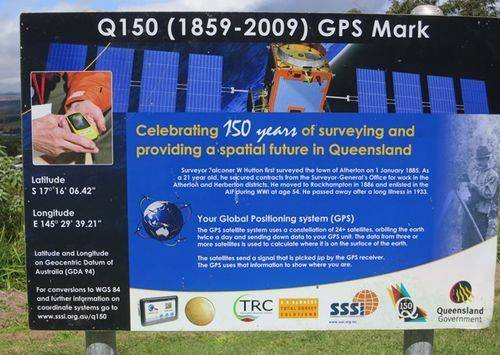
Home » Themes » Landscape » Settlement
Q150 GPS Mark Print Page 

The spatial sciences profession ( surveyors, map makers and those who work with location information) placed over 60 GPS Marks at significant locations around Queensland during 2009 to commemorate the 150th anniversary of the State of Queensland and 150 years of surveying.
The marks accurately depict latitude and longitude and provide the public with a means to check the accuracy of their in-car, in-boat and hand-held navigation devices.
The project was launched at the Museum of Lands, Mapping and Surveying in Brisbane on 24 June 2009.
Queensland's early explorers were often surveyors. Local members of SSSI (Surveying & Spatial Sciences Institute) Queensland will tell the stories of early surveyors and map makers by placing signs adjacent to many of the GPS Marks and celebrating 150 years of Queensland's history through public events celebrating the past and showcasing the future of the profession.
Location
| Address: | Centenary Drive, Hallorans Hill, Atherton, 4883 |
|---|---|
| State: | QLD |
| Area: | AUS |
| GPS Coordinates: | Lat: -17.26845 Long: 145.494225 Note: GPS Coordinates are approximate. |
Details
| Monument Type: | Plaque |
|---|---|
| Monument Theme: | Landscape |
| Sub-Theme: | Settlement |
| Approx. Event Start Date: | 1859 |
| Approx. Event End Date: | 2009 |
Dedication
| Approx. Monument Dedication Date: | 2009 |
|---|
Q150 (1859 - 2009) GPS Mark
Celebrating 150 years of surveying and providing a spatial future in Queensland.
Surveyor Falconer W Hutton first surveyed the town of Atherton on 1 January 1885. As a 21 year old, he secured contracts from the Surveyor-General`s Office for work in the Atherton and Herberton districts. He moved to Rockhampton in 1886 and enlisted in the AIF during WWI at age 54. He passed away after a long illness in 1933.
Your Global Positioning system (GPS)
The GPS satelitte system used a constellation of 24+ satelitte, orbiting the earth twice a day and sending data down to your GPS unit. The data from three or more satellites is used to to calculate where it is on the surface of the earth.
The satellites send a signal that is picked up by the GPS receiver. The GPS uses that information to show where you are.



